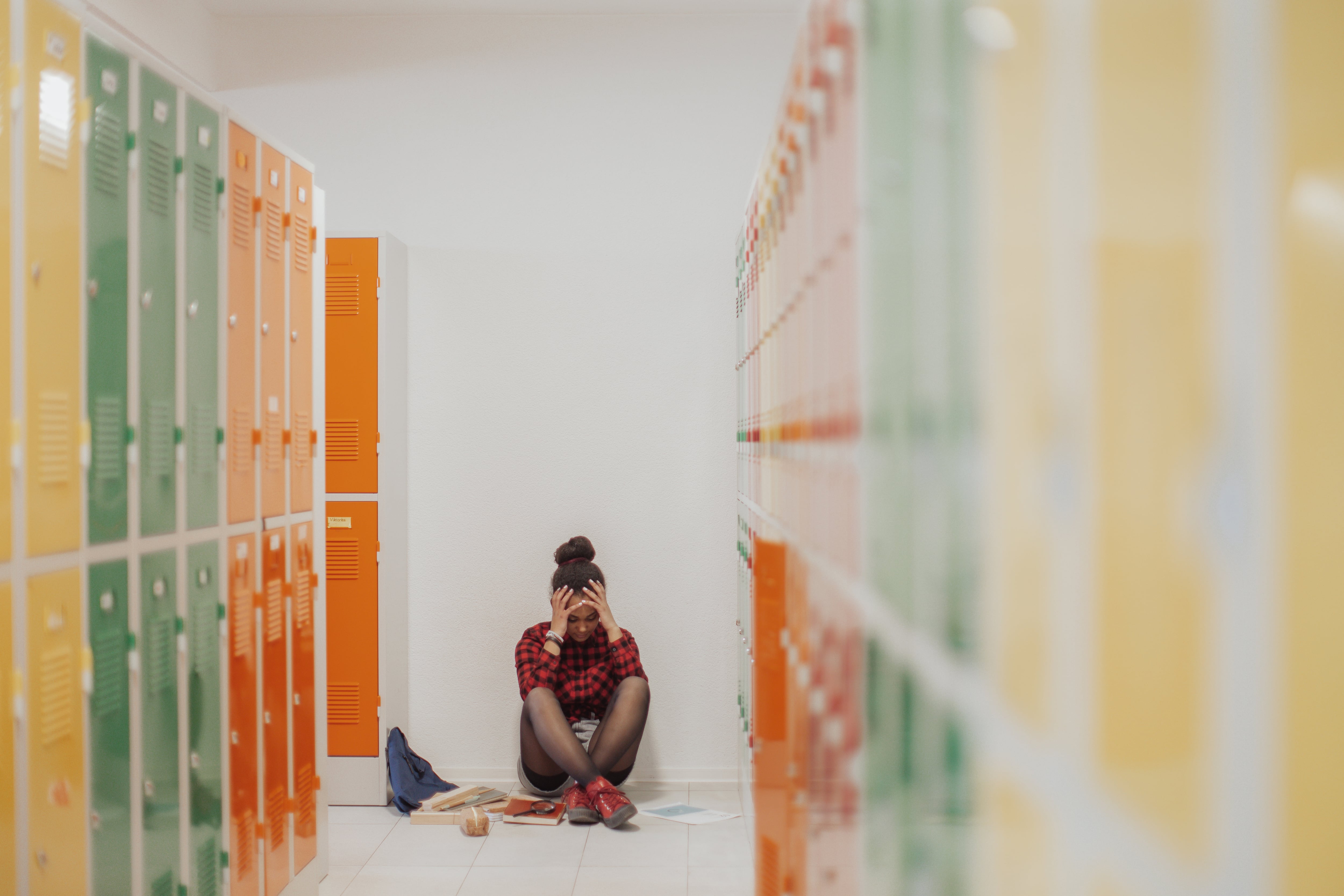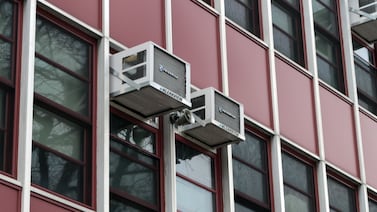Karalynn Santiago’s father died on Nov. 28. She has struggled to get through each day since.
Karalynn, a 15-year-old 10th-grader at Western International High School in Detroit, took four days off school to grieve her sudden loss.
When she returned, she felt overwhelmed by the amount of material she missed in class and how much she had to catch up on to make passing grades by the end of the quarter.
“Imagine, four days off,” she said, recalling the struggle this week. “I’m still in the grieving process. I don’t want to do the work, but I know I have to … . On top of everything else I’m going through, it’s hard.”
A bill proposed in January in the Michigan Senate recognizes the challenges faced by children like Karalynn. It would allow K-12 public school students to take up to five excused absences each school year for mental or behavioral health issues, without a note from a doctor or therapist, and would require schools to let students make up any school work they miss.
Additionally, educators would be able to refer students who take two or more mental health days to counselors so they can get help.
Karalynn said she feels the bill would benefit her and many other struggling youth.
“There’s a lot of kids here going through a lot of stuff,” Karalynn said. “And I know that’s one of the main reasons kids skip. I feel like that would be a good thing for us.”
Others caution that it’s only a small step that won’t have much effect unless students who are struggling have wider access to help and resources.
Mental-health challenges are a barrier to learning
The legislation is part of a growing national effort to help schoolchildren dealing with mental health challenges such as anxiety, depression, and suicidal ideation, which have been exacerbated by the pandemic.
Twelve states have enacted similar legislation as of May, according to Verywell Mind, a website that tracks health and wellness bills. Another eight states, including Michigan, have had bills for student mental health days introduced by lawmakers.
“Kids can’t learn if they are struggling or experiencing other issues in their lives,” said state Sen. Sarah Anthony, a Democrat from Lansing who introduced the bill.
Anthony said she was inspired to author the bill after hearing from many constituents who said they wanted their kids to have more flexibility to address their mental health. Her family’s experience also influenced the legislation.
“When I was running for state representative, my older brother passed away and he left behind five kids,” she said. “We needed to have that flexibility when the kids were having a bad day. Whether it’s a death or a loved one being ill, these things can have lasting effects.”
Anthony said that when the Legislature returns for its next session, she will advocate for it to move quickly through the Senate Education Committee and to a vote, and expects it to gain bipartisan support.
“Everyone we’ve talked to — Republican or Democrat — they know that mental health is one of those key pieces that people in their districts care about,” she said.
Support for mental health days is broad
The need for student mental health days has grown in recent years, advocates say, as many adolescents are still dealing with the impact of trauma and isolation brought on by the pandemic. And the idea is becoming more popular.
In a 2022 poll by the National Alliance on Mental Illness, 67% of children ages 12 to 17 said they thought schools should offer mental health days. Most also said they wanted their schools to help address their mental health and educate them on where to find resources.
Parents back the idea, too. A 2021 poll conducted for NAMI found 70% of parents supported students taking days off for their mental health. The poll also found 87% of the parents were in favor of mental health education in schools.
“I have done this with my own children when they are in a stressful situation or are feeling down and tired,” said Jennifer Rothman, director of youth and young adult initiatives at the NAMI.
In the decade leading up to the pandemic, the number of teens reporting persistent feelings of sadness and suicidal thoughts increased by around 40%, according to the Centers for Disease Control and Prevention’s Youth Risk Behavior Surveillance System.
The potential causes of the increase are complex, and research does not point to any singular reason, said Matthew Diemer, professor at the Marsal Family School of Education at the University of Michigan.
According to the most recently compiled data by the National Institutes of Mental Health, an estimated 15% of youth ages 12 to 17 in 2021 in the U.S. had experienced a major depressive episode, or a period of at least two weeks of experiencing symptoms of major depression, such as thoughts of suicide or feelings of hopelessness.
More than 20% of teens have had suicidal ideation, or serious thoughts of suicide, a 2021 report from the CDC said.
The start of the COVID-19 pandemic, March to October 2020, coincided with a spike in mental-health related emergency-room visits for youth ages 12 to 17: a 31% increase compared with 2019, CDC data shows.
How absences can help students get help
Giving students time to address their mental health would likely help them do better in the classroom, supporters of the bill say, citing years of research showing a link between poor academic performance and mental health problems.
Moreover, if a student takes a mental health day, that attendance record could be used to trigger a response from school officials to target resources to that student, said Anthony.
The data could be used to guide changes at the district and state level, too, Rothman said.
“It could get some conversations happening about more funding to address the need for more counselors and what other resources need to be brought in,” she said. “If we see a lot of students are using this, we will recognize we need more time and effort and funding put into mental health education.”
Rothman said she’d like to see the states that already have student mental health days collect more data on how often kids are using those days.
Some skeptics of the bill argue that kids may abuse excused mental health days as a way to skip school. Michigan is already struggling with high rates of chronic absenteeism.
Some administrators argue that the bill isn’t needed because absences are already considered excused when a parent tells the school their child won’t be there.
“If a parent calls a school and says their child is home sick it’s an excused absence, whether it happens to be mental or physical health,” said Wendy Zdeb, executive director of the Michigan Association of Secondary School Principals. “Schools usually ask for a doctor’s note in a longer-term situation.”
Still, Rothman said many parents may not be aware that it’s OK for a child to take a day off solely for their mental health.
“Not every parent thinks that that is a reasonable excuse to keep kids home,” she said. “This gives a needed spotlight to the fact that mental health is just as important as physical health and that we need to allow students time to address it.
By allowing excused absences without doctors’ notes, supporters of the bill say, it would benefit students who can’t easily access mental health services in the state, which has a shortage of adolescent psychiatrists, especially in rural communities.
As for the potential for abuse, Rothman said, “The way we look at it, if it helps even one student, it’s worth it.”
Students need resources when they return to school
Some researchers caution that students need more than days off to deal with mental health challenges: They need support when they return to school.
“I think the policy is a step in the right direction,” said Diemer. “But I don’t think giving days off without any other improvements would lead to desired changes.”
Karalynn, the Detroit student, said her school paired her with a therapist earlier in this school year, but she hasn’t gotten support from any mental health professionals since her dad died.
“Not every student shows the same emotions physically,” said Karalynn. “Some can have a straight face, but you don’t know that they’re going through something. You don’t know what’s going on at home. You don’t know what’s going on behind closed doors.”
Detroit Public Schools Community officials did not respond to a request for comment about Karalynn’s experience.
Michigan has long had a shortage of student mental-health resources. The state lags behind almost every other state in the ratio of students to counselors.
Anthony, the bill sponsor, said the bill is one of several addressing mental health she’s introduced. Both she and Rothman agree that more needs to be done.
“This is not a fix-all,” said Rothman. “It’s a step in the right direction to get some of those conversations happening. We need more funding to address the need for more counselors and to make mental health programs more accessible to those who don’t typically have access.”
Karalynn said she feels the adults around her don’t believe her or her peers when they ask for help.
“If we ask to go to our therapist or a counselor or even to the bathroom to deal with it ourselves, I feel we should be able to go, because you don’t know what we’re going through,” she said. “I feel like these parents, these faculty members don’t understand that. And I know they’re going through stuff, too.
“I know it’s not easy,” she said, “but we’re people. We’re human.”
Hannah Dellinger covers K-12 education and state education policy for Chalkbeat Detroit. You can reach her at hdellinger@chalkbeat.org.





